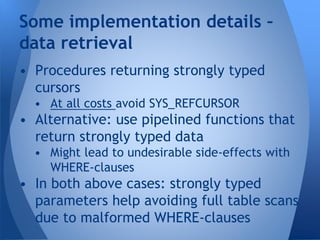Case study- PL-SQL API as data protection mechanism
- 1. Case Study: PL/SQL API as data protection mechanism in Oracle databases by Ziemowit Jankowski Database Architect
- 2. Intended use ˇń Large databases ˇń Intensive updates ˇń Heterogeneous environment ˇń Many external actors with potentially misbehaved applications or ad-hoc queries ˇń Due to enterprise nature impossible to know who is doing what and how ˇń Non-existent or insufficient GUI- capabilities for users
- 3. ˇń Consistency in updates (triggers and constraints) ˇń Updating/reading in correct context (triggers, VPD) ˇń Authorized access (Oracle authorization, roles, VPD, ACL) ˇń Protection against misbehaved application: ˇń Reading ˇń Updating (e.g. improper transaction handling) Data protection ¨C a look at the broader meaning
- 4. ˇń Exposing data structures to external actors: o Access to ˇ°more than neededˇ± o Dependency on data model o ˇ°Funnyˇ± updates ˇń Misbehaved applications and/or users ˇń Mal-formed SQL queries o Sub-optimal data access paths ˇń Possible need for multiple implementations of business logic A few pitfalls for ˇ°classicˇ± approach
- 5. Example scenarios Database (triggers, constraints, VPD etc) App server Valid ation Automated application Other database GUI-based application
- 6. ? Updating ? Validation of data ? One place, one algorithm ? Complex validation algorithms ? Avoiding bad application / user behaviour ? Updates independent from data model ? Retrieval ? Controlled access paths (performance) ? Validation of search conditions ? Results independent from data model ? Logging ? Security through obfuscation Some benefits of an API in data handling
- 7. ? Software platform specific: ? .NET ? Java ? Others ? Common platform ? Oracle PL/SQL Different API implementations
- 8. ? Pros ? One point, one algorithm for all data validation ? All ˇ±internalˇ± data validation close to data store (overhead elimination) ? No ˇ±out of controlˇ± access paths ? Cons ? PL/SQL based ? Hard to understand for novice programmers Oracle PL/SQL API
- 9. Example scenarios revisited Container schema (data, metadata, stored code) App server Validation Automated application Other database GUI-based application Access schema Access schema Access schema
- 10. ? Container schema includes: ? Data containers (tables, views, mviews) incl. triggers, constraints etc. ? Data retrieval and data manipulation code ? Interface data model, abstracted from underlying data model ? Access schema includes: ? Execution rights to data retrieval and manipulation code in container schema ? Synonyms pointing at relevant code in container schema General principles
- 11. ? Actors connect to database through access schema ? Actors do not have direct access to data ? Actors do not have direct access to meta-data ? Actors have to use predefined access paths in orderly manner ? Actors cannot circumvent data validation, on purpose or by accident Usage
- 12. ? Usually not a major problem ? Might become major performance issue: ? Data-intensive updates ? Large data volumes ? Time critical updates (e.g. quasi-realtime) ? Non-trivial validation ? No possibility to take in ˇ°dirty dataˇ± and validate later on ? In-database validation inside API usually faster than external application Data validation
- 13. ? Examples: ? Long rollbacks ? Commit waiting for user interaction ? Long transactions on quasi-real-time data ? Culprits: ? Rookie application programmers (been there, seen that) ? Interactive users ? Insufficient validation of data Eliminated by API that enforces some basic rules. Bad behaviour
- 14. ? Enforced usage of correct data types ? Example: WHERE to_char(dateCol,ˇŻYYYYMMˇŻ) = ˇŻ200101ˇŻ ? SQL statements entirely within API code ? No user-generated statements that cause poor performance Controlled access paths
- 15. ? The API defines own Oracle types for data retrieval and update ? The API types may or may not correspond to actual data containers ? Changes in table layout can be hidden from caller ? Backward compatibility ? No need to rewrite all applications using the altered table/-s. Independency from data model (retrieval and updates)
- 16. ? Procedures returning strongly typed cursors ? At all costs avoid SYS_REFCURSOR ? Alternative: use pipelined functions that return strongly typed data ? Might lead to undesirable side-effects with WHERE-clauses ? In both above cases: strongly typed parameters help avoiding full table scans due to malformed WHERE-clauses Some implementation details ¨C data retrieval
- 17. ? Procedures accept strongly typed parameters ? Procedures return status code or message Some implementation details ¨C data update
- 18. ? SOA ? Will not deliver same throughput ? Will lock you in an infrastructure Alternatives?

















